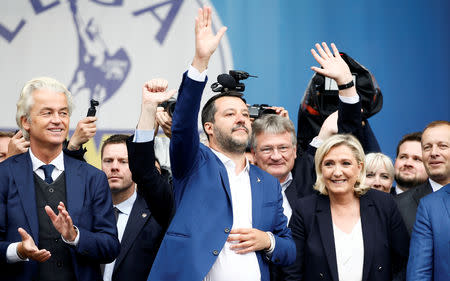EU vote may shift power in main euro zone states, stall integration
By Jan Strupczewski
BRUSSELS (Reuters) - Expected gains for populist eurosceptic parties in this week's European Parliament elections could prompt a shift in the political balance of power in leading member states and stall moves towards deeper economic integration.
Voting across the 28-nation EU runs from Thursday till Sunday and eurosceptic parties are forecast to do well, including in the three biggest countries of the euro zone, Germany, France and Italy.
An exit poll in the Netherlands, which along with Britain voted on Thursday, showed mainstream pro-EU parties performing surprisingly well but analysts warned against reading too much into the Dutch results.
"Concerns are high that the centre ground continues to fragment (across the EU) and that populists succeed in sufficient numbers to derail further European integration," ING bank said in a note.
The EU Parliament has little direct say on euro zone economic policy but an assembly dominated by eurosceptics could hamper moves to deepen integration of the single currency area and make it more resilient to future shocks through the creation of a special budget and euro zone-wide deposit guarantee scheme.
GERMANY
Polls show that in Germany, the euro zone's biggest economy, the Social Democrats (SPD), junior coalition partner of Chancellor Angela Merkel's conservatives, is likely to win fewer votes than in the 2017 national election, when it recorded the worst result in its post-war history.
If the SPD also suffers defeat on Sunday, as expected, in local elections in Bremen where the party has ruled for 73 years, it could embolden those who want to pull out of Merkel's government and rebuild their party's popularity in opposition.
That could increase Berlin's reluctance to accept any far-reaching euro zone reforms such as a substantial euro zone budget to stabilise economies since the SPD is seen as more enthusiastic towards euro zone integration than Merkel's party.
However, some euro zone officials said that even if the SPD were to pull out, the gap could be filled by the Greens, the most pro-integration German party, who are seen gaining strongly in the EU election.
FRANCE AND ITALY
In France, polls show Marine Le Pen's eurosceptic National Rally could win more support in the election than President Emmanuel Macron's strongly pro-EU Republic on the Move party, which would be a big blow to a president already weakened by six months of "yellow vests" protests.
Macron is the main champion of euro zone integration with the boldest ideas on a joint budget, but defeat by Le Pen in Sunday's vote could weaken his ability to push through reforms at a time when Germany is becoming more resistant to change.
In a further likely blow to integration, in Italy Matteo Salvini's far-right League is tipped to win more than 30% of the vote on Sunday, according to polls.
If that happens, Salvini could push for early national elections to get rid of his 5-Star coalition partner and rule alone or in coalition with Forza Italia, euro zone officials said. Salvini denied on Wednesday he would do that.
Strong support for the League would also give Salvini ammunition for another confrontation with the European Commission over fiscal policy after an unprecedented clash in the second half of 2018 when Rome refused to cut its budget deficit and public debt as required.
Salvini has been calling for a review of the EU's budget rules so that Italy could cut taxes, even though its deficit and huge debt are on the rise.
Italy's loose fiscal policy is already the main reason why Germany now rejects a European Deposit Insurance Scheme (EDIS), fearing German depositors would have to bail out Italians if Italian banks got into trouble.
"For Germany, Italy is the real problem when discussing EDIS and this is also the reason why there is no progress at all with EDIS," one senior euro zone official said. "If Salvini wins I am convinced that there will never be a full mutualised EDIS."
Italy has proportionally the second highest public debt in the euro zone after Greece at above 130 percent of GDP, an almost stagnant economy and a rapidly falling primary budget surplus, a measure which excludes interest payments.
Euro zone officials said Salvini's plans for further fiscal loosening could increase the threat of a debt crisis in Italy and make Germany and its northern allies even more reluctant to agree that the nascent euro zone budget, due to be created from 2021, should be used to stabilise economies under stress or be of any meaningful size.
(Reporting By Jan Strupczewski; Editing by Gareth Jones)

 Yahoo Finance
Yahoo Finance 


